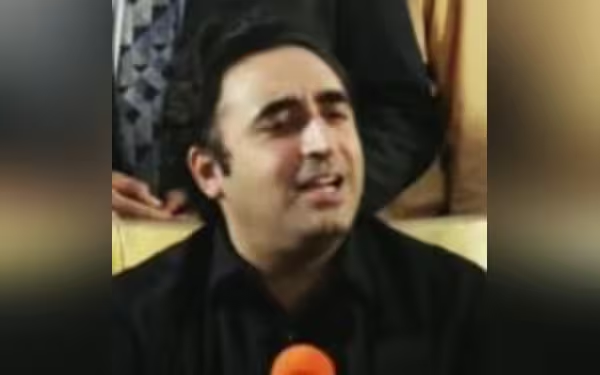Saturday, November 16, 2024 04:56 PM
Bilawal Bhutto-Zardari Pushes for Constitutional Amendments Without JUI-F Support
- Bilawal vows to advance constitutional reforms despite JUI-F opposition.
- Judicial reforms deemed essential for Pakistan's governance.
- PTI criticized for prioritizing personal interests over national welfare.
 Image Credits: pakistantoday
Image Credits: pakistantodayBilawal Bhutto-Zardari is determined to pursue constitutional amendments despite JUI-F's refusal to support the government's proposed package.
In recent developments in Pakistan's political landscape, the Pakistan Peoples Party (PPP) Chairman Bilawal Bhutto-Zardari has made a bold statement regarding constitutional amendments. Despite facing a significant hurdle with the Jamiat Ulema-e-Islam (JUI-F) chief Maulana Fazlur Rehman refusing to support the government's proposed constitutional package, Bilawal remains determined to push forward with these amendments. This situation highlights the complexities of coalition politics in Pakistan, where support from various parties is crucial for legislative success.
Bilawal's commitment to advancing constitutional reforms comes after he initially emphasized the necessity of JUI-F's backing for such changes. In a recent interview, he expressed the importance of consensus-building, stating, "We want everyone on board for these amendments." This reflects a desire for unity among political factions, which is often challenging in Pakistan's diverse political environment. He acknowledged the efforts made in discussions with Maulana Fazlur Rehman, but also indicated that the PPP would not be deterred if an agreement could not be reached.
One of the key points raised by Bilawal is the concept of constitutional courts, which he argues is rooted in the Charter of Democracy—a historic agreement between the PPP and the Pakistan Muslim League-Nawaz (PML-N). He stressed that judicial reforms are long overdue and essential for the country's governance. Bilawal stated, "For these reforms to be meaningful, it’s essential to listen to all perspectives." This statement underscores the importance of inclusivity in the reform process, as it affects not just one party but the entire nation.
Bilawal also took the opportunity to criticize the Pakistan Tehreek-e-Insaf (PTI) and its leader Imran Khan, suggesting that the PTI is more focused on personal interests rather than the collective good. He remarked, "The PTI seems intent on halting both the judicial system and parliament itself," indicating a belief that political maneuvering should prioritize the welfare of the country over individual agendas.
The backdrop of this political struggle is significant. The ruling coalition, led by the PML-N, faced a setback when JUI-F's refusal to support the amendment bill derailed their efforts. Despite extensive discussions in the National Assembly and the Senate, the government could not secure the necessary votes. Maulana Fazlur Rehman has been firm in his opposition, citing concerns over the government's secretive approach to the legislative process. With JUI-F holding crucial votes, their support is vital for any constitutional changes to take place.
The ongoing dialogue surrounding constitutional amendments in Pakistan reflects the intricate nature of coalition politics. Bilawal Bhutto-Zardari's determination to move forward, even in the face of opposition, highlights the challenges and complexities of governance in a multi-party system. As the political landscape continues to evolve, the need for collaboration and consensus among various factions remains paramount for the future of Pakistan's democracy. The outcome of these discussions will not only shape the legal framework of the country but also influence the political dynamics for years to come.













